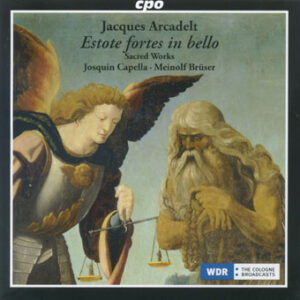Jacques Arcadelt was a highly prolific, very successful Renaissance composer of mostly secular vocal music. He was born and educated in Belgium, then eventually went to Italy where his numerous innovations merging Italian mannerist spirit with Franco-Flemish polyphonic sophistication distinguished him as one of the most important founders of the mature Italian madrigal form. His madrigals were also remarkably popular during his lifetime since they tended to be simple and catchy, all but eschewing any dependence on virtuosity. They were, for instance, often intentionally laced with elements of the chanson so that amateurs as well as professionals could sing them.
Arcadelt also wrote a fair number of sacred works that, given the diverse selection offered here by the Josquin Capella and director Meinolf Brüser, apparently were conceived in a similar fashion. Be it the four-part Lamentationes Jeremiae, the eight-part Pater Noster, or any of the five-, six-, or seven-part settings included on the program, the vocal fabric of the ensemble (and hence, often its beauty) is always reliant on the simplicity and accessibility of the parts. When the text requires drama, such as in the opening motet Estate fortes in bello, instead of compromising the harmonic uniformity with a dominant voice, Arcadelt skillfully weaves pairs and trios of voices to achieve the effect. By contrast, in the Agnus Dei movement of the following Missa Ave regina caelorum, where the austerity of the few poignant lines is subtle, the gradations of the ensemble are delivered in near chant-like unison. While the text in the previously mentioned Lamentationes Jeremiae certainly lacks such austerity or subtlety, the male quartet is equally successful in its similar delivery.
The sound is fine, a little reverberant though not lacking in detail. The only other currently available recording of Arcadelt’s sacred music is Le Divin Arcadelt by Musica Contexta (Chandos) featuring selections accompanied by a small consort of instrumentalists. Although there is some debate about the authenticity, and thus appropriateness, of performing these vocal works with instruments, Musica Contexta’s renditions are nevertheless very beautifully done, joining the current release from the Josquin Capella as worthy and recommendable introductions to Arcadelt’s sacred music.
































